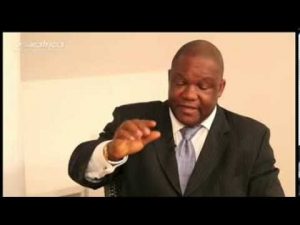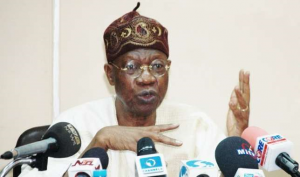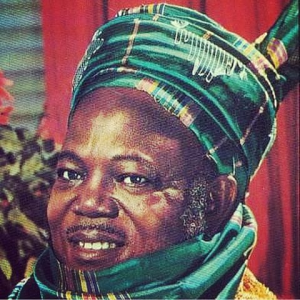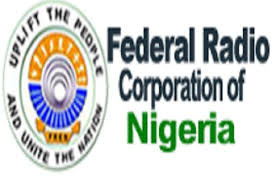
Dr Obed Mailafia, the guest lecturer

Lai Mohammed, Information Minister

Dr Mansur Liman, DG, FRCN

Sir, Ahmadu Bello, the late Sardauna of Sokoto
It was a case of the Sardauna of Sokoto and only Premier of the defunct Northern Nigeria is dead but long live the Sardauna last Thursday at the 11th Annual Lecture of the Federal Radio Corporation of Nigeria, (FRCN) which took place in Abuja. It cannot be taken away from Mohammed Bello, the FRCN top gun tasked with introducing Dr Mailafia and who said no collection of adjectives would be inapplicable to the guest lecturer. In other words, you would be right if you call Mailafia a development economist, an international public servant, a public finance expert, an academic or an opinion leader in Africa. Obed as he is more popularly known is all of these and perhaps more. Recently in an interview with this medium, Dr Yima Sen made the point about the different types of economists when it comes to the question of which type makes a good material in economic advisory on managing the Nigerian economy. He certainly had an Obed in mind among those who can reframe the key questions about the economy in a way that a country such as Nigeria would not lose out. That is the sense in which Obed is as distinguished as they come.
Obed can be said to have taken the lecture as a very serious challenge. It shows in a number of features in his presentation, the most important of which was tying his argument around important questions in confronting the topic: Fighting Corruption and Growing a Sustainable Nigerian Economy”. One of it was the question of what constitutes corruption. That is, he did not assume that corruption is something everyone knows. Even in concluding that just as no cancer could be called benign, so might be there nothing like small or big corruption, he did so only after taking note of the different claims on the concept, including the claim of the group of economists and sociologists that corruption is not all negative because it serves a redistributive or cleansing purpose. By doing so, Obed shielded himself from those who may accuse him of one-dimension reashttps://intervention.ng/wp-admin/post-new.phponing or dogmatism, thereby safeguarding his agreement with those he called moral theologians for whom there is no distinction in sinfulness because every sin is a rebellious behaviour. The policy implication is that there should be no difference in treatment for aiding and abetting the grounding Ajaokuta after an expenditure of $18b and for collecting dirty N20 bribe from motorists as a police man on the road. Similarly, he sees greater concentration on corruption in the public service even as corruption also goes on in the private sector.
He gave a graphic instance of what corruption can do to even those that might be thought least vulnerable to its plausible consequences. He was referring to the case of the late Bishop Gabriel Ganaka whom immigration officials in London insisted on stripping and searching. When he told them he was a Bishop, they replied: so what? He developed a heart condition subsequently which permits linkage between that experience and his death. What all these add up to is Obed’s rejection of binaries in discussing corruption: it cannot be categorised into small or big corruption; it is not a public versus private sector thing and it is not a big versus small man phenomenon. Finally, it is not exclusively internal to Nigeria. There is also an international dimension to it, he says, citing the enthusiastic respondents to the enticing emails from criminogenic Yahoo boys.
From this position, he pushes the widening and broadening argument that sees corruption beyond the rather narrow focus on graft to as wide as the corruption that goes on in the universities; churches and mosques especially the activities of those he called prayer contractors he said were committing unimaginable wickedness under the cover of religion, especially the narcotising dosage of misinterpretation of the Holy Books to unsuspecting audiences; the professions, (Journalism, medicine and law were his focus).
And then he asks: where does corruption come from? His answer rejects any notion that corruption is a Nigerian, citing global stars of Nigerian who lived beyond reproach and as attested to by their peers across the world. For him, collapse of value at the family level and the influence of globalisation are to be held responsible. Nollywood, Kannywood and other woods as well as Google, Facebook and other such sites have become the alternative spaces for the youths in the search for role models.
The Long Shadows of the Sardauna of Sokoto
It is the context of the broader notion of corruption by the guest speaker that this piece must, at this point, veer off to ‘the long shadows of the Sardauna of Sokoto’. The point is that Mailafia’s broadner’s view of corruption took on board or provides a framework for understanding this matter that surfaced out of plan in the lecture. Samson Shuaib, a former Director-General of the FRCN used his own two minutes on the podium to claim that fair is foul and foul is fair or words to that effect in fighting corruption, a justification he linked to the possibility of reclaiming the era in Northern Nigeria when from villages that cannot be found on any maps, children of the poor who scored high marks were picked without any minister deleting any such names to make way for children of the rich. It immediately struck everyone that something important had been mentioned. It might have rested there if Lai Mohammed had not elaborated.
But that turned out to be the more substantial of what the minister had to say. In fact, according to him, it was not just that the son of a peasant, a miner could get his share, could attend the most prestigious schools without pulling any strings or knowing any minister. It was also that “(Northern) Nigeria was so organised that the system went as far as anticipating that the poor man’s child might not have transport money to respond to an invitation to an interview or respond to an offer of admission and went ahead to make a provision for that. The system did so, not by giving the prospective student cash but by issuing him, (were there ‘her’ then in the school system?) the train warrant that would take him across. In Lai’s case, there was a bus waiting around 4 am at the train station to convey them to the premises of Government College, Keffi, followed by a hot breakfast. This is not to talk of the balance in the admission exercise such that each of the 13 provinces in the region had a candidate. “The rest went to Barewa and others”, said Lai in a joking chauvinism in favour of Government College, Keffi. But the biggest was yet to come from the Information Minister who added how tuition was commensurate with the ability of one’s parents to pay. In Lai’s case, he was paying £3 while the son of the Prime Minister was paying £36. Yet, they were in the same school, same teachers and same food, etc. This is something that some people would call communism if advocated today.
What Shuaib and Lai Mohammed brought out is what this piece has called the long shadows of the Sardauna to the extent that the Sardauna was the leader who presided over all these. So, the question would be: how was the Sardauna able to do all these flawlessly and the generation after him could neither improve on it nor maintain what was on ground? The Sardauna never went to Oxford or Harvard, was certainly not a widely travelled man. Yet, over 50 years after his demise, he is still the only name in town. Of course, we all called him names as part of our radical activism but today, there is no escaping the Sardauna, whether you are talking of the educational arena, agriculture, media arena, management of diversity, merit and fairness. Could Yakubu Lame, former Minister for Police Affairs, be right when he said recently at a civil society platform that the political leaders of the First Republic were adequately groomed for leadership and power? And that the chaos and decay of today are phenomena traceable to the military incursion into politics? All of these strengthen Mailafia’s argument that corruption is much, wider than graft and that the consequences of such acts of corruption are no less troubling.
Against this background, he considers that starting an anti-corruption campaign must be the same thing as embarking on a revolution. There are risks and care must be taken because, as he puts it, “corruption fights back. That’s the nature of the beast we are fighting”. Secondly, he subscribes to the anti-corruption war being part of a grand strategy rather than a stand-alone campaign. For one, he fears that we don’t know where “some of the so-called herdsmen” are coming from. And that the Avengers are still around.
While this can be taken as his key normative suggestion, there was a practical suggestion Mailafia had tucked away inside his lecture. On the basis of data from the World Bank, the Mbeki Panel set up by the African Union, Chatham House in the United Kingdom, the Okigbo Report and similar other sources and considering the humongous amount of money involved in terms of transfer of capital from Africa in general and Nigeria in particular, Mailafia advocated a 2 – year amnesty to all those who have stolen and stashed away huge sums outside to bring such money and invest in the country. That brings to two, the number of people who have made such suggestions.
A decade ago, the late Dr Ibrahim Tahir presented a similar argument. He deserves to be quoted at length: The point is that in the light of the fortunes being stashed by individuals and which the government itself has affirmed and also the US Department of State, Transparency International and sundry foreign sources, how can we convince ourselves that transition is going to be anything but war? Think about the guy out there with $10 billion in his account. He wants to be President and he could not have his way. He would organize his way and that prospect means we are faced with a security issue, not just corruption issue.
My solution would have been that we have some kind of decided action in 2007. That is that a resolution of the National Assembly would absolve everyone of guilt in all events in our history since January 15, 1966. But this must be conditional on the implementation of a parallel but integral national restitution action. That would require replacement of something like the EFCC with a National Restitution Council with power to work with EFCC as its Secretariat and investigation agency to lay all materials with respect to allegedly hidden or stolen funds and somehow negotiate with those allegedly holding them and agree on a move of returning them, allowing a certain percentage to be retained by the accounts holder, whether foreign or local. The point would be to initiate various legal measures and all kinds of indemnity in association with all actors-from foreign governments, Banks and business houses.
After this exercise, then an Act of absolution in the National Assembly which would mean closing all files including of coup makers but excepting that of rapists, murderers, arsonists.
That was Ibrahim Tahir in a newspaper interview in 2006. This is Obed in 2016. So, a much more pragmatic response to the challenge of corruption would seem to be emerging.
In sinking his teeth into the guest lecturer’s presentation, Dr Aminu Yusuf Usman of the Department of Economics, Kaduna State University and the discussant maintained that a whole year was lost before the economy received attention from the Buhari regime. For him, government was slow and allowed the economy to float. He notes a disconnect in the anti-corruption war and growing the economy, locating the disconnection in the scoring criteria of the common man. The common people, he said, assess governments based on their own quality of life or welfare, not on the basis of how many people have been arrested. With the precedence set that an incumbent can be defeated, he stressed growing the rural economy as the only way out because, according to him, it is already being said that the anti-corruption war is already a killer. He warned against portfolio investors who could disappear depending on the situation on the ground and argued that since only local investors cannot disappear, the option of ‘amnesty’ for the corrupt to bring their loot back and invest was worth thinking about.
Well, as Obed said, the president is the one in charge. He could choose to surprise Nigeria just as he could choose to muddle through. As Marx said, men do not make their history as casually as they please but Marx did not say that men are prisoners of History.
This report which concludes Intervention’s coverage of the 11th edition of the FRCN Annual Lecture is also part 2 of the coverage, part 1 of which started is entitled “Nuhu Ribadu, Obed Mailafia, Others Fight Corruption at FRCN 11th Annual Lecture”




























